How Solar Works DC is adding solar capacity today, while developing the skilled workforce of tomorrow
Tarik Mickel first learned about solar power almost a decade ago. At the time, he worked in electrical meter installation. One of his coworkers also installed solar panels, and Mickel was entranced by the idea. He kept asking his coworker for more details. “It was so exciting to me, because I love science,” Mickel says.
But solar power wasn’t widespread enough then to support a career for Mickel. “Maybe two homes out of a thousand had solar panels,” he explains. He continued working other jobs — but he didn’t forget his excitement about solar power.
In 2017, when the newly launched Solar Works DC program announced they were seeking job trainees, Mickel jumped at the chance. He is now enrolled in the program’s fall cohort. Over the course of 12 weeks, he and his fellow trainees will spend two days a week in the classroom and two days in the field.
On field days, the cohort splits into two groups for a two-day installation. Each trainee will get hands-on experience installing solar panels on 12 homes, and the whole cohort will complete 24 installations in total.
The best part? Each of those 24 homes belongs to a low-income family, who will receive the solar panel installation absolutely free — saving them hundreds of dollars each year on their electricity bills.
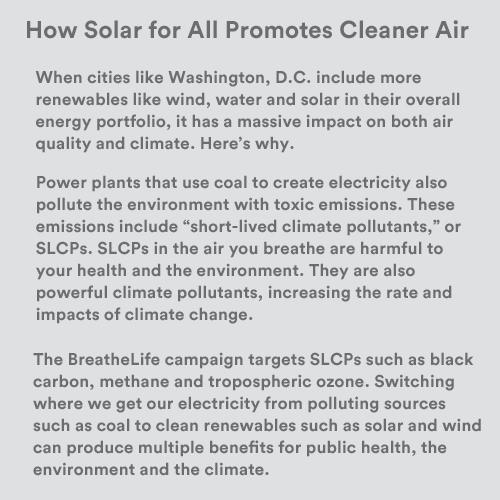 Solar Works DC is a program developed in partnership between the District of Columbia’s Department of Energy & Environment (DOEE) and Department of Employee Services (DOES). It’s one aspect of Solar for All, the District’s solar energy initiative launched in 2016. The innovative approach of Solar Works DC accomplishes two major goals at once: increasing solar capacity across the district while also developing a qualified local workforce to expand the District’s solar capacity long-term.
Solar Works DC is a program developed in partnership between the District of Columbia’s Department of Energy & Environment (DOEE) and Department of Employee Services (DOES). It’s one aspect of Solar for All, the District’s solar energy initiative launched in 2016. The innovative approach of Solar Works DC accomplishes two major goals at once: increasing solar capacity across the district while also developing a qualified local workforce to expand the District’s solar capacity long-term.
The program is administered by GRID Alternatives Mid-Atlantic, a non-profit organization dedicated to bringing solar panels to low-income families. The project is supported with a $950,000 grant from Solar for All, the District’s new solar energy initiative. (Read about DC’s new Renewable Portfolio Standard, signed into law in 2016.) More than half of that grant goes toward the solar panel technology for 60-100 installations over the course of the year, or about 300 kilowatts.
“We’re very happy to have this opportunity to play a leadership role in this innovative program that’s not only benefitting communities through solar power, but also creating sustainable career pathways for trainees,” says Nicole Steele, Executive Director of GRID Alternatives Mid-Atlantic. “It’s a win-win all around.”
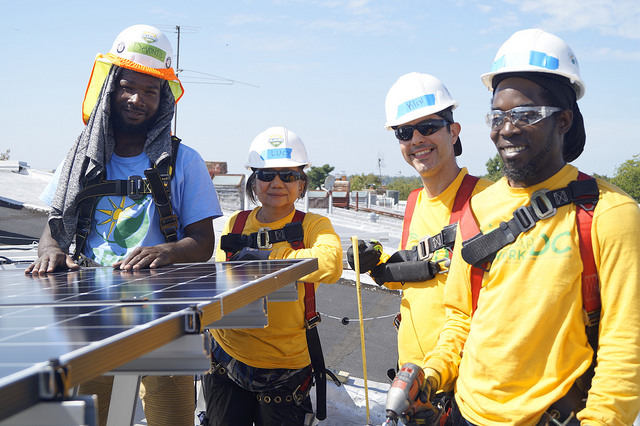
From left: Devonta Sanders, Lucy Menon, Klensy Liscano and Tarik Mickel
BUILDING TRUST
Debra Walker is one person benefitting from the program. Walker lives with her wife in the home she’s owned for fifteen years. Her yard was already eco-friendly — she even has a rain barrel. She loved the idea of solar, too, but the out-of-pocket cost was too much. Then she learned about the Solar Works DC program from a neighbor, who’d just gotten solar panels installed by GRID Alternatives herself.
At first, Walker couldn’t believe the solar panel installation would really cost her nothing. “When Raymond [Stanton] said, ‘Ms. Walker, the cost is free… I was like, ‘No, nothing is free, Raymond.’ He was like, ‘Yes, it’s free.’ When they came down and talked to me, I still think, There is a cost coming out of my pocket. I know solar panels are expensive.”
That type of skepticism is common, says Nicole Steele. In fact, one of the biggest challenges her organization faces is convincing potential candidates that the offer is serious — and the cost really is free. “A lot of it goes back to building trust in the community and leveraging those early adopters,” says Steele. Most people who end up participating learn about the program from a friend, relative or neighbor, as Walker did. “We work closely with our solar ambassadors to spread the message to peers and family.”
Walker’s home turned out to be an ideal candidate for solar panel installation, with a roof in good condition, an up-to-date electrical system and a yard that soaks up plenty of sun. The job trainees arrived at her home bright and early on the morning of September 14th to install her new solar panel system.
The two-day installation process went smoothly. Walker even enjoyed having the trainees around. “I interacted with them both days and it was such an awesome team. Everybody was so pleasant. Everybody was involved.” She served the team coffee and lunch, and the team enjoyed posing for pictures with Walker’s three dogs.
Now that she has the solar panels installed, Walker will save an estimated $500 annually on her electric bill.
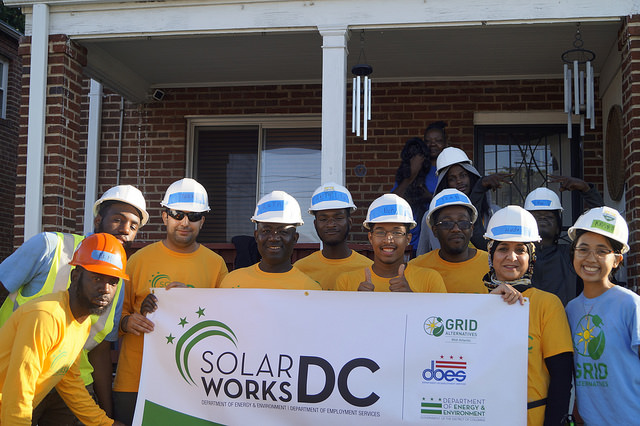
The Solar Works DC trainees pose with Mrs. Walker after a successful solar panel installation.
“I feel like I’m putting my feet into fresh concrete. One day I’ll say I was a part of this. I helped my city go green. I helped save my earth.”
SPREADING THE WORD
Tarik Mickel is enthusiastically embracing the role of solar ambassador himself. “Every day, when I get on social media, I post my pictures and people ask questions.” He even wears his bright yellow “Solar Works DC” t-shirt every day, not just on installations. He says he gets questioned about it on the metro all the time; another great opportunity to spread the word about solar. “This is what we do,” he tells people. “We’re trying to go green, which can help millions, including yourself and your family…. and save tremendously on your bills.” That last part, he says, always gets people’s attention. Then he gives them the number for GRID Alternatives and makes them promise to call.
When he’s not evangelizing solar to interested strangers, Mickel is studying his “solar bible”: Sean White’s Solar Photovoltaic Basics, the leading study guide for the entry level professional exam. “I live with that book,” Mickel says. “My kids get mad at me and say, ‘Daddy, put the book down!’”
Despite his passion for his new career, Mickel did encounter one brief obstacle. On the first installation day, he went up on the roof — and discovered his fear of heights. He sat there for a couple minutes, too nervous to move, reviewing his options. “I went through this brain process, saying, ‘I’m going to need to do something else with my life, because I cannot get back on this roof.’”
Then a supervisor came and talked to him. “He said something real simple,” Mickel remembers. “He said, ‘Listen, you might be a little nervous, but sitting down is going to keep you nervous and scared. You got to get up and you got to move.’” So Mickel got up. And he moved. And he kept moving. He overcame his fear, and now, he says, he’s “part-spider.” He loves being on the roof and works up there every chance he gets.
After he completes the twelve-week training program, Mickel hopes to find full-time work in the industry. “This is a life-changing moment,” he says. “I feel like I’m putting my feet into fresh concrete. One day I’ll say I was a part of this. I helped my city go green. I helped save my earth.”
He doesn’t have a job lined up yet, but is confident he will find one, with support from the Solar Works DC and GRID Alternatives team. “Regardless, I’m not going to stop. I’m here in solar. I’m not going anywhere.”
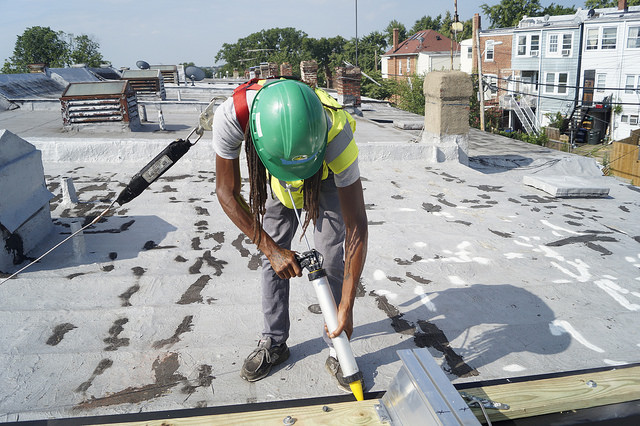
Dexter Rawlings (Solar Works DC summer cohort)
GRID Alternatives isn’t just teaching people about solar power; they are also teaching them how to become community leaders and ambassadors for solar power and alternative energy.
PLANTING A SEED
Devonta Sanders participated in the Solar Works DC program over the summer, and he hasn’t stopped with solar, either. After the six-week summer program, he was hired by GRID Alternatives as an AmeriCorps Fellow, along with two other trainees.
The 23-year-old learned about Solar Works DC through its crossover with DC’s Marion S. Barry Summer Youth Employment Program, which matches hardworking young people with summer job opportunities. Sanders chose construction — with a special focus on solar.
From his high school job in construction, Sanders already had experience clambering around on roofs. The Solar Works DC program taught him how to lay out solar panels, how to carry the modules without breaking them, how to properly hook into a safety harness, how to use the tools and lots more. He also assisted with six different solar panel installations, one per week.
One of his favorite parts of the program was the focus on problem-solving. “If we were missing one clamp, or the rails were too short, we would problem-solve the layout approach so the installation would still pass safety inspections.”
In his role at GRID Alternatives, he still does some construction and installation. He also manages paperwork back at the office, applying for permits, assembling safety plans, printing out projects plans and more. He helps out in the warehouse and packs the van for jobs. Long-term, he hopes to become an instructor and teach others about solar power.
Sanders really values how the experience has connected him with people from all different walks of life, with a vastly diverse set of experiences and skills. “We can all learn from each other. No matter what I want to know about, I can find someone who has done it and can teach me that.”
Drawing on the abilities of the community is central to GRID Alternatives’ approach. Steele describes it as a “barn-raising model.” “Folks refer to us as the ‘Habitat for Humanity of solar,’ because we recruit and utilize volunteers from the community to help do the installations. You don’t need to have knowledge about solar before you start; we will teach you everything. You just need an hour of safety training.”
GRID Alternatives isn’t just teaching people about solar power; they are also teaching them how to become community leaders and ambassadors for solar power and alternative energy. Like Mickel, many participants want to make a difference in DC — and then, maybe, the world.
Steele recently welcomed the new group of Solar Works DC trainees. “It gave me goosebumps while I was talking to them. It was such a diverse group, made up of people from all over the world that now live here in the District.” A lot of those people would like to one day take what they’re learning back to their countries of origin.
“It’s like a seed being planted,” Steele says. “Where could it lead?”
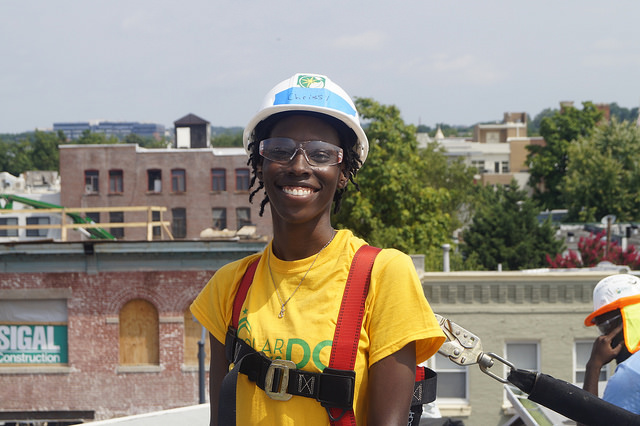
Christina Dawson (Solar Works DC summer cohort)
FIND OUT MORE
The next Solar Works DC cohort begins in March, and recruitment is starting now. And the program is always looking for interested households who meet the income requirements for receiving free solar panels.
Get more information about enrolling in the program as a trainee.
Find out if you qualify to receive free solar panel installation.